Golden Visa last call under the current rules
From 1st January 2022 onwards, the Portuguese Golden Visa will have new rules. For more information, please click on Portugal’s Golden Visa Rules will change in 2022.
Until 31st December 2021, there is still time to benefit from the more favorable regime in force, as follows:
It is possible to obtain a Golden Visa by investing in real estate, of any type and anywhere in Portugal, in one or more properties, whether singly or in co-ownership, purchased either individually or through a single-member private limited company, such investment being of at least €500,000.00 (reduced to €400,000.00 if located in a "low density area").
It is also possible that the investment is done in real estate and its rehabilitation, of any type and anywhere in Portugal, whether singly or in co-ownership, purchased either individually or through a Portuguese single-member private limited company, provided that one of the following conditions are met:
- the property was built at least 30 years ago and the property purchase price plus the ex-VAT value of the rehabilitation works contract is at least €350,000.00 (reduced to >€280,000 if located in a "low density area"), or
- the property is located in designated areas of urban rehabilitation and the purchase price plus the ex-VAT value of the rehabilitation works contract is at least €350,000.00 (reduced to >€280,000.00 if located in a "low density area"). In this case, if the total price of the property's purchase plus the rehabilitation works does not reach €350,000.00 (reduced to >€280,000.00 if located in a "low density area"), it is possible to keep the balance deposited in a Portuguese bank account.
In order to apply under the above-mentioned rules, applicants must submit the public deed as well as the Land Registry Certificate with the ownership registered in the investor´s name (among other documents) until the end of 2021. We shall be available to assist you with all the process and help you taking advantage of the regime in force.
The changes coming, applicable only to investors and their families who submit their application after the new Decree-Law comes into force in 1st January 2022, and specifically regarding the real estate investment and its rehabilitation for residential purposes, will be limited to properties located in the islands of Madeira and Azores and the interior territories of Portugal, identified in the Annex to Ministerial Order no. 208/20017 of 13th July.
Therefore, the real estate investments for residential purposes will be excluded from the Golden Visa scheme in Lisbon Metropolitan Area, the Western coastal area territory, Porto Metropolitan Area (except for the Municipality of Arouca and the parishes of Junqueira and Arões in the Municipality of Vale de Cambra) and in the majority of the councils located in the Algarve territory.
Areas for Golden Visa Real Estate Investment
Residential Purposes
The exceptions in the Algarve are the Municipalities of Alcoutim, Aljezur, Castro Marim, Monchique and Vila do Bispo, the parishes of Alte, Ameixial, Salir, Union of Parishes of Querença, Tôr and Benafim in the Municipality of Loulé, the Parish of São Marcos da Serra in the Municipality of Silves, and the Parishes of Cachopo and Santa Catarina da Fontes do Bispo in the Municipality of Tavira.
In conclusion, investors who are still interested in the Portuguese Golden Visa can submit their residence permit applications through real estate investments until the end of 2021 under the above-mentioned conditions and all their investment rights will be protected.
If you require assistance with Portugal’s Golden Visa, do not hesitate to contact us at info@lvpadvogados.com.












